Mentors: Why You Need One, What It Takes, And How to Get Them
116: Everything you MUST know about mentors.
Before we continue with today’s post. Similar to what we did in our earlier post this month. Shoutout to anyone who has supported our work over the last few weeks by printing out the Mindset Rewiring Workbook and posting it on Twitter. Thank YOU. Results? Back on the #1 spot as we have been for a few weeks (at least at the time of writing this).
Welcome reader! Considering the number of young people reading our website. One of the things we need to go over is the mentors. It is something we have been asked about on Twitter multiple times, making it a perfect opportunity to create a whole post around it. Everyone who has had a mentor or still has one knows they are a game-changer. Since our mentor recently passed away (RIP). We took some time to reflect and share our thoughts on mentors. Why do you want to get one? Do you need one? What is holding you back? We are bringing you everything you need to know about mentors.
What we are going to cover in this 25 minute post:
Mentors and why you want to get one (+ prerequisites for finding a mentor:)
The psychological aspect (your starting point + how NOT to waste your mentor’s time + top performers)
What most people get wrong about having a mentor (top 10 things)
What it takes to get a mentor (checklist + how to get one + mentor-like figures)
Conclusion (+ our advice on this and your goal once you make it)
Who should read this post:
People up to the age of 35 (can be applied for older, but the chances of you finding a mentor are slimmer each year)
College students (massive ROI here)
People who are just starting their first jobs (another massive ROI here)
Those who are feeling lost and trying to get better at a specific thing (can be career, biz, sports…)
Mentors And Why You Want To Get One
Additional reading on the topic:
Why you need a mentor: There is a lot of confusion about why someone would want to get a mentor. The best way to put it is to imagine someone giving you a specific blueprint or step-by-step approach to solving your problem. As a result it will save your time, energy, effort, and everything else that comes with the learning process. One that has proven effective and is relevant to your situation. Or at least has worked before. That is the best way to describe why someone would want to get a mentor. When you start putting it into that perspective, you come up with the idea that a mentor should help you improve one or two areas of your life. This is the basic approach, and it should cover most of the benefits. Results? They will carry over to all areas of your life. Meaning that getting a mentor is the positive ROI (if you have done the filtering part right), making it something everyone should consider. Or at least position themselves in a position to be in so that others are willing to share their knowledge. Another reason mentors are so powerful is that lessons and life experiences can’t be learned. It is something that requires you to listen to feedback and trust that they are acting in your best interest.
Why you need a mentor (psychological aspect): We have separated this from the psychological part of the read that you will be able to find further below. Why do you need a mentor from a psychological perspective? Not necessarily strictly psychological. But the reason you want to find a mentor is to have someone who helps you create the person you hope to become. Someone whose advice you find applicable to your situation and the life you are living. Advice that will inspire and guide you to do the things that align with your future vision. One way to look at it is that finding a mentor will help you minimize mistakes. As a result, it should make it easier for you to become the person you want to be. This gives you the option to observe someone who has done it before you + give you an overview of where they are now + and if that is something you want to follow through with.
Mutually beneficial relationship: We begin with a crucial dynamic that everyone seeking a mentor-student relationship needs to understand. Mentor-student relationships are mutually beneficial. Meaning? If you are not bringing anything to the table. You won't find a mentor. Simple as that. Now you might be wondering how you can bring something to the table when the same reason you are looking for a mentor is to help you get better at something. This is one of the traps that most people get wrong, and something that you should look at from another angle. The reality is that you bring multiple things to the table. Those that your mentors might be missing. This allows you to create a genuine connection with someone that can last for years. This is exactly what you should look into when it comes to the whole mentorship situation, and approach it from the right angle. The things you are bringing to the table, especially if your mentor is older (which is often the case):
Energy (limited resource)
Time (limited resource)
Potential (they see in you what others can’t)
Knowledge they don’t possess (you can make their life better)
Gratitude (everyone respects someone who can show it)
Wrong approach (mindset) to getting a mentor: After years of writing on the internet and answering multiple DMs. Plus, connecting it with real-life stories and things you see around yourself. The most common reason people struggle to find mentors and waste time is that they are looking at mentorship from the wrong POV. What do we mean by that? You can’t look for a mentor before you have tried to achieve things yourself. Trying to find someone to help with a business? But have you never started the business in the first place? Trying to get better at socializing. But you never go out? What do you expect to get out of this approach? These are common examples of methods that don’t work when it comes to getting a mentor. You don’t go out there looking for a mentor to help with the first step. Why would they? It is a complete waste of time because, deep down, they will subconsciously pick up that you are not serious enough and need hand-holding to push things through.
No one will do that part for you. Since it is morally and from a time perspective impossible to push through - the mentor should spend hours on someone to push through. You want a mentor to help you become more efficient with what you already do. But there comes a moment when you will get stuck and the answers won’t be obvious (they usually are, but we just get too lost in it and miss the perspective). Conclusion? If you are not already working towards your goal. Putting in the effort or building what you are trying to build… Finding a mentor might be a waste of your time. Not only is it a waste of time, but there is also a good chance you will leave a bad impression and destroy your reputation with someone who might be of enormous help down the line. Remember, it is all about the long game. Burning bridges or thinking short-term won’t get you very far and it dosen’t make much sense.
Prerequisites for finding a mentor: The reason we are putting prerequisites in the intro part tells you enough about the importance of the same. It is also something you will be able to connect through the dots of the whole post to see the big picture in your head. It would be a lie to tell you that everyone is ready to have a mentor. That is not the case. One could argue that it is quite the opposite. There are certain things you have to take care of to be in a position where you will be able to pick up the pieces of advice, apply them to your situation, and move forward. To not make this unnecessarily long.
You should NOT be wasting your time trying to find a mentor if you don’t meet all the criteria:
Trying to get the mentor before you have given something a try at least 10 - 20 times on your own. We are not talking about half-assing it, but legit effort and tries.
Massive ego and inability to put it aside.
High-energy.
Pain tolerance to push through when things get tough. They will.
Lack of energy and gratitude. They are a massive factor and will play a big role in how your mentor perceives you.
Minimal negative beliefs about yourself (more on that in the next chapter).
The Psychological Aspect
Your starting point: We have never seen ANYONE mention this in this context. Yet, it is something that can’t be denied or ignored. Your starting point (mental, psychological, and even the energy you possess). Play a massive role in the mentor-student dynamic. Since you know that a mentor-student relationship is a connection-based relationship. How do you think it makes them feel on the other side when they are giving you all the answers, yet you still can’t meet their expectations or deliver at all? Where does that lead? Everyone reading this knows that one of the most frustrating things you can experience is spending hours on something only to be in the same place as when you started. Or even worse with someone. Imagine your mentor spending hours on you, helping you get better, and you are still in the same spot you were before. This is just a basic overview of something that goes deep.
Now layer deeper.
What about your limiting beliefs and other psychological blocks that will eventually become obvious to your mentor? Well, you already know what to do. The #1 thing you should be doing is dealing with your limiting beliefs and any self-imposed limits. This needs to be addressed from the beginning. Or better said, before you even start working with a mentor, is that if it does not get solved. You are going to be limited. Not just you, but also your mentor. Not to repeat ourselves. Imagine you believe someone is capable of doing something because you have managed to achieve the same with a bit of effort. Meaning you know that it is possible. You have someone on th other side who possesses many talents, and you can see it. But once given the simplest task, they fail to deliver because they themselves do not believe that they are capable or that they deserve it. Not 100% understanding of what you are capable of? Start with mental model work before seeking out a mentor. You have to be in a position of positive outlook on your situation and feeling that you are capable of achieving, no matter what gets thrown at you… Because you are capable.
Never show that you are desperate: This should not be here. But we could not help ourselves. As soon as someone senses that you are desperate for their help or guidance. You lost them. Abundance. No matter how hard it is or where you are in your life. NEVER show that you are desperate. This also applies to every other area of your life.
Don’t waste your mentor’s time: The point above about limited self-belief and the frustration that comes with it directly relates to wasting your mentor’s time. This is categorized under the psychological aspect because it is mainly psychological. When someone provides guidance and offers a mentor-student relationship, you need to find the most optimal way to get the most out of it with the least input. Better said in a way that you become as efficient as possible. Not only do you need to find it… You have to find it to demonstrate that you are a serious individual who does not have time to play games. Not delivering on the results? Frustration. Leading further to being a time waster. Results? Reputation destroyed. It should be one of your goals never to find yourself in this category, knowing you are fully aware of the risks and the impact. Having a mentor is not risk-free, considering that your reputation is at stake.
Common signs you are wasting a mentor’s time (NOT just psychological):
Not taking into consideration advice given and still doing things your own way (don’t ask for advice if you don’t plan to follow through).
Not building the relationship (only playing the transactional game)
Negative self-beliefs and other self-imposed limitations around your full potential.
Not being prepared (when an opportunity arises and you get to the room with your mentor + for any other opportunity that your mentor is preparing you for).
Unable to establish the genuine connection (trust) required for someone to mentor you.
Asking the wrong questions.
Top performers - your mentors: We were unsure whether to include this or not. The reason we are doing this (mentioning it) is that top performers (and in this case, your future mentor) tend to operate differently. Some of them are straight-up weird, others eccentric, and some are full-blown narcissists. Should you care? It would be a lie to say not. Would you be able to eliminate all the negatives and quirks that come with them? No, you won’t. This leaves you with two options: 1) ignore the advice and skip potential mentorship, or 2) stay open-minded. Since you are here reading this post. There is a good chance that you will have to take care of the psychological aspect and focus on accepting them as they are and for what they stand for. The only way to do that is by becoming open-minded and learning to appreciate them for who they are. It is not an easy job. It is also completely unrealistic to expect your mentor to be 100% aligned with you. If that is the case, consider yourself lucky. The real "metric" that counts, and one you should be looking for is whatever advice your mentors are giving you that gets you closer to the position you want to be in. You already know what you need to do and what will get you further. But do they give high-level advice or just basic tips everyone already knows? Extra points if you operate on a higher level, and what they share is behind your current knowledge and skill level. Massive red flag. It is a clear sign you should reconsider if they are worth being called your mentor.

What Most People Get Wrong About Having A Mentor - Things You Should Not Ignore
In no particular order.
Ignoring advice: If you find yourself in a position where someone has wasted their time trying to give you their advice. But you are finding it hard to accept it or justifying why it might be the right thing to do. You are playing a one-sided game that will lead to frustration from your mentor's side. Which will lead to time waste. Finally? You will lose not only the mentor but also someone willing to help you with your specific situation.
You don't need a mentor, you need a (trainer, consultant, doctor): Worth mentioning since this one is easy to confuse, and it is quite common. Suppose you are preparing for your first marathon. Do you really think you need a mentor or a trainer? The same goes if you are just starting at the gym and trying to get stronger. No one can deny that the mentor-student relationship has a stronger connection and that there is much more to it. However, the opportunity cost and other factors make it not worth the effort. We have already mentioned that you should have 1 - 2 mentors max at the same time, and our advice is to choose those who cover larger aspects of your life. Not necessarily something that you are just doing for once (let’s say marathon prep). Things do get complicated here. But knowing when to look for a trainer, professional, consultant, or doctor instead of a mentor can save you a lot of trouble.
You are not putting enough effort into exposing yourself to potential mentors: If you think a mentor will come looking for you… You are doing it wrong. It is up to you to take control and position yourself so that someone with more experience than you offers to help (because of a specific reason they see), and others don’t. You won't be able to force that feeling out of someone either. It has to come naturally.
Expect a mentor to hand-hold you: No one with a lot going on in their life and doing the right things will have time to hand-hold you through everything. This is something we often read about that young people expecting someone else to support them every step of the way, no matter how easy or hard it is. That is not how things work, and it is the wrong approach. You have to take control into your own hands and not 100% rely on the support of others or ask for feedback for every single thing you do.
You can have multiple mentors: What most people get wrong is that they think that you can only have one mentor. That is wrong. The right approach is to have different mentors for different areas of your life. Improving at business is different from getting better at golf or any other hobby. You get the point. It is just up to you to understand how to separate these roles and what it takes to manage them all. In general, having one mentor who will cover all the areas of your life? Impossible.
The other side clearly states that they will mentor you: You would be surprised how often you will hear people expecting someone to tell them that they are their mentors explicitly. This won't happen. In case it does… It is not very common. Forget about those things you see in the movies. The social dynamics and real life are quite different. There are bigger chances that the other side will tell you how they are ready to provide you with the advice and experience. Which automatically means you can consider that as mentorship. We have decided to mention this because it feels natural for us, yet we understand that there is a good chance that most inexperienced young people do expect to hear it coming from the other side. Something to keep in mind.
There is an ego attached to your image: If you already hold a set of beliefs that you are 100% set on (and form your life perspective around them). It is going to be hard for the mentor to help you. You need to be fully aware of your mistakes and failures to move forward. The same goes for your mentor. If they have really made and are fully aligned with who they are… There is nothing to worry about.
Not being picky enough when targeting your potential mentor: You don't want just anyone to be your mentor. Neither do you want someone who has not done it themselves to tell you how to do it. You always have to go for someone who has been (or is) in a position that 80% of the people around you won't reach. That's the real key to finding a mentor who you can fully leverage to your advantage. A basic career/job example is that you don’t go for middle managers, but for those roles that require much more. That does not mean people who have not achieved that are not worthy. But people who go further usually possess qualities that others don’t. You already know where your competitive advantage will come from.
Expecting mentors to find YOU: It won’t happen. You either seek a signal (with your behavior) or you can forget about it. It does happen, but often at much later stages when you are already established and have enough to put on the table. A mentor-to-mentor type of relationship, where two experts with different visions come together to build one thing. Ive - Jobs is the perfect example of that.
No offering anything in return: As already mentioned in the post. The idea that you can get a mentor without offering something is nonsense. You have to provide something in return for the knowledge they provide. One of the wrong approaches to the whole mentor-student connection is thinking that there are going to be free handouts. That definitely becomes a story once the connection is formed and you are both operating on an already established friendship connection. Initially? You can forget about it. One side is going to screen the other, and going in with the mindset that you will get something for free because you managed to take an hour or two of their day (especially with initial meetings) is wrong. The least you can do? Offer genuine appreciation. Gratitude. If it is sincere, it will take you far. The second level? Show them that you are the person you present yourself to be. Take the advice given → apply it to your life → get more out of it → let them know. These two basics already set you up massively and will provide you
What It Takes to Find a Mentor
Finding mentors: We wish there were one answer to this question. However, that is not the case. The best approach to finding a mentor is to offer something valuable that can improve their life. What do we mean by that? If you can improve someone's life in one way or another. There is a good chance that they will be ready to improve yours. Better said, there will be a transaction between two parties (you - mentor), and each one will bring something to the table. When you know that you can bring something to the table and make life better for the other side. That is when you will find your mentor, and everything will click. You don't have anything to add to someone's life? You are not ready to have a mentor. This is the fundamental principle you need to understand to find a mentor.
Mentor quality (filtering): There is a good reason why we are starting the list with filtering. Not every mentor who will offer you guidance will be a good fit for your situation. What do we mean by that? There are specific criteria and filters that must be met to be considered for a position that requires an open-minded approach. Better said. They have to earn it. No one can deny that listening to those with more life experience can always provide you with an interesting angle. Or something you have never thought about before. But it is not necessarily something you 100% want to offload and blindly follow. The same dynamic applies when potential mentors are used to filter out anyone who tries to take a piece of their mind. The key difference lies in what each of you is looking for and the criteria around it. What key traits should you look for in your mentor? Ability to coach, minimal ego, has done it himself, proven track record, or any other form of results that can back up what he stands for. You should not be easy on these criteria, and you should absolutely not let anyone influence your thoughts and perspectives. This applies to everything, not just mentors.
Are You Mentor Worthy? Checklist
These are the questions that require a clear answer.
Have you already tried to get better at _____ on your own? If the answer is no. This is the end of the discussion, and you don’t need a mentor in the first place. Try to do it yourself first.
Are you sure you need a mentor and not a coach? You might be playing the wrong game and not taking into consideration opportunity costs. Pay attention.
What are you bringing up to your potential mentor?
Possess zero negative beliefs about yourself or limitations? Be honest with yourself.
Do you know exactly what you need help with? If the answer is too broad and you don't have a specific area of your life (or even better, an activity). It is a waste of your time.
Are you ready to commit and follow through with the advice given?
Has your mentor done it himself and based his advice on his life experience?
Have you completed the necessary due diligence and managed to filter out the serious mentors from those who are not?
Creating your opportunities: Everyone who has been reading us for some time… Knows that we are heavy on the exposure and opportunities. What does that mean here? Proximity, boldness, courage, and hard work. Without these four elements, you are playing the game on hard mode. What do we mean by creating opportunities? There is a good chance that the random DM you send to someone will bring you more positive results than a bunch of the other stuff being mentioned around. The same logic applies to proximity. The closer you are to potential mentors, the easier it is to connect with one. The same goes for boldness. Without asking for something, you won’t know if it is a yes or a no. This is also why you often hear that you find a mentor on your job. To not go in-depth here and off topic (this is something we will cover in a future post)… You should do everything possible to increase your chances of getting noticed by someone who has done what you are trying to achieve. Over time, you realize that getting a mentor often becomes quite the opposite of what is being preached around. What do we mean by that? There is a good chance that if you focus on creating your opportunities and stick to key elements, the mentor will find you. Not the other way around. Better said, the random opportunity you never thought possible might become a reality.
Mentor-like figures: Not necessarily mentors. But.. We wrote about it last year on Twitter. Suppose you are in a situation where you lack access to anyone or are still figuring out how to get yourself to the proximity of someone (nothing wrong with that) or how to reach out to someone or are having negative beliefs that hold you back. One approach is to find a mentor-like figure to model your choices after. What does that mean? Pick 1 to 3 individuals you find inspiring and study everything you can about them. Biographies, documentaries, articles… Whatever you can get your hands on. The other route is to find those who have achieved what you are trying to achieve and model their approach. Picking up relevant pieces and extracting them → making them relevant for your situation. Those two scenarios should be more than enough to cover everything using this approach.
You want to approach from the perspective that you can apply your life situation to their worldview. This is not a 100% efficient method, and it is hard to compare with real mentorship. But you would be surprised how many insights you could get out of this. This should provide a high-level overview and everything you need to know to start gathering data around it. The last thing worth mentioning is that as soon as you start studying an individual, if you feel that they are too off or you can’t see what they are seeing (relate to their vision and how they are doing stuff). Stop trying to pick up those mental models and approaches. They are a waste of time in your case. Instead, start looking elsewhere for those who may be more relevant for your situation.
Paying for mentorship: This is where the whole discussion is, whether something that you are paying for can be classified as mentorship or just a service that the other side provides in insights. It is hard to distinguish. To a point, it is unnecessary. To keep it short. Yes, there should be space in your life to pay someone to guide you or provide you with insights you never thought about. It is something that should be encouraged, and one way to see it is as buying back your time. Every new thing you learn allows you to spend less time and get more out of it. We do it. Professional athletes do it. People you know who are achieving big things do it. So why not you? Paying to learn something new is worth it. Should it be considered a mentorship? Not really. It is just a common term used now to describe services.
Main takeaways on how to find a mentor:
You have to bring something to the table.
You don’t want anyone to be your mentor - filter them.
You want to create opportunities whenever there is a chance to do so - proximity, boldness, courage, and hard work.
There is a good chance that if you are doing the right things... Mentors will find you, not the other way around.
Can't find a mentor and not confident enough to look for one? Start with mentor-like figures that you will base your actions on.
Learn how to invest your money to save yourself time. Pay to learn should be normal and encouraged.
Final word: Once your mission is complete, you should feel comfortable, happy, and confident that you are doing the right thing. Getting access to limited resources (knowledge, people, places) and everything else that comes with them. It is time to return the favor. One of your goals should always be to help young people who feel lost or are looking for help to improve their situation. Just as someone else has helped you when you felt lost. This is an unwritten rule of life, and you should not go against it. What do we mean by this? It means it is time for you to return the favor and become someone's mentor. Good luck, you got this.
Disclaimer: None of this is to be legal or financial advice of any kind.




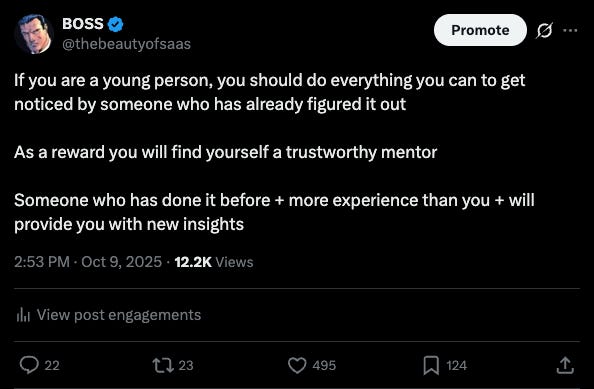

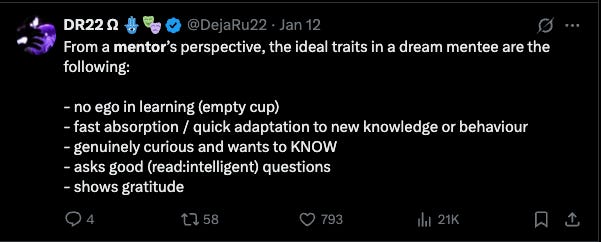
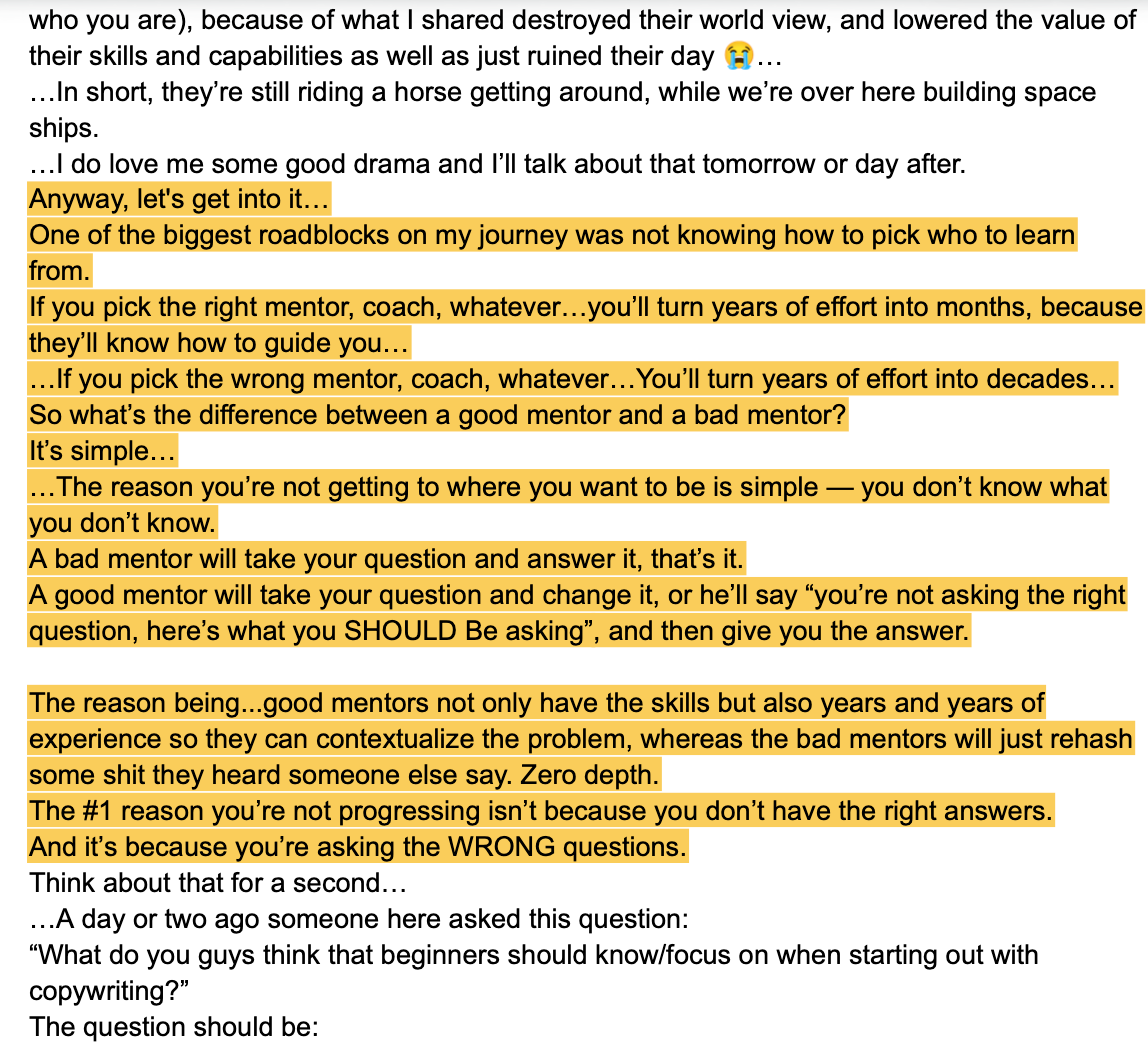
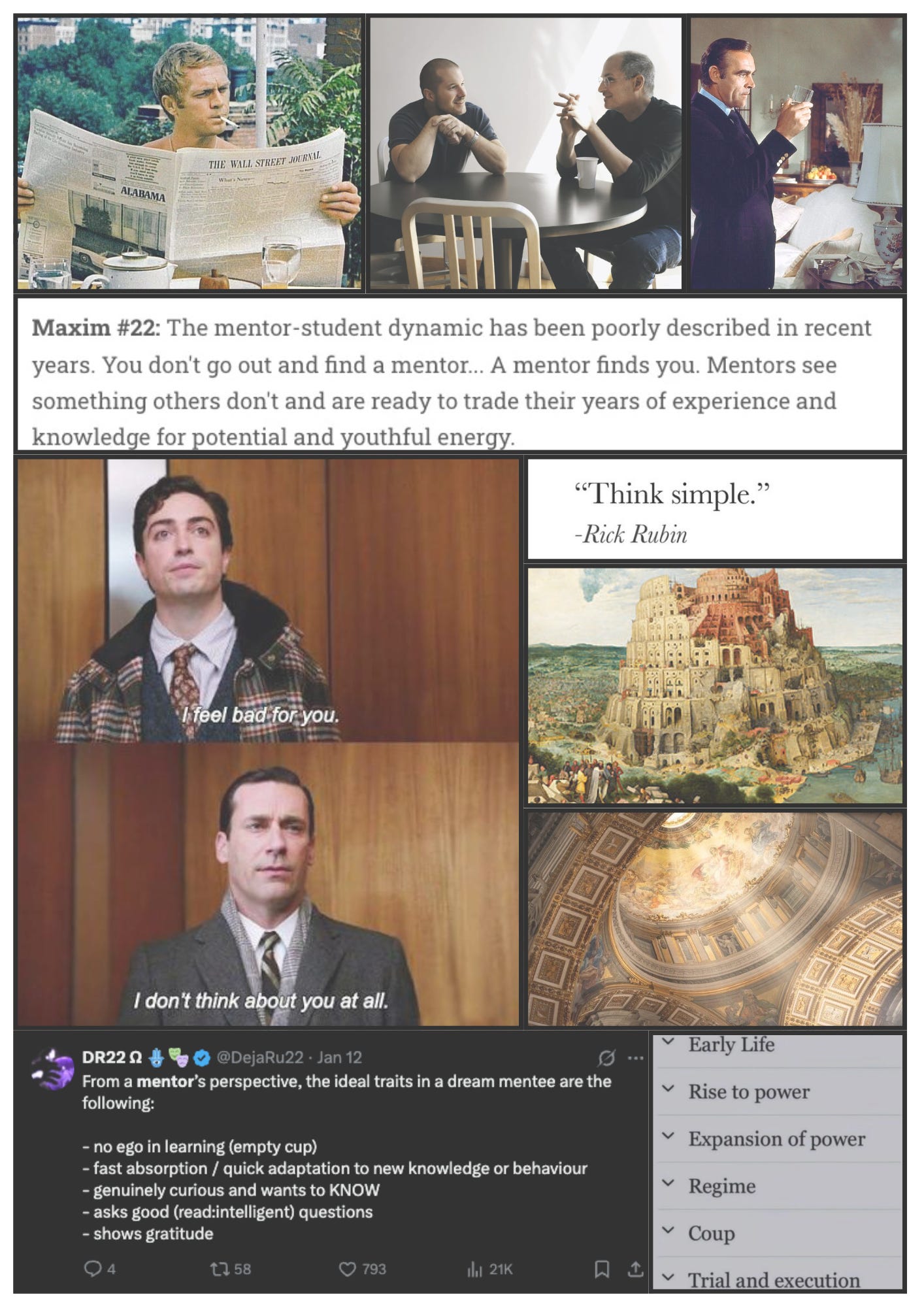
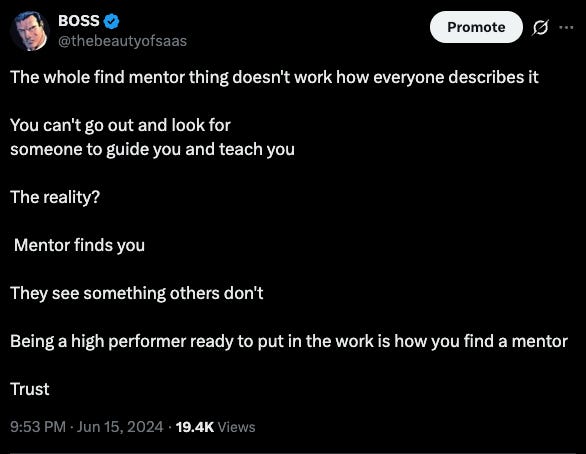
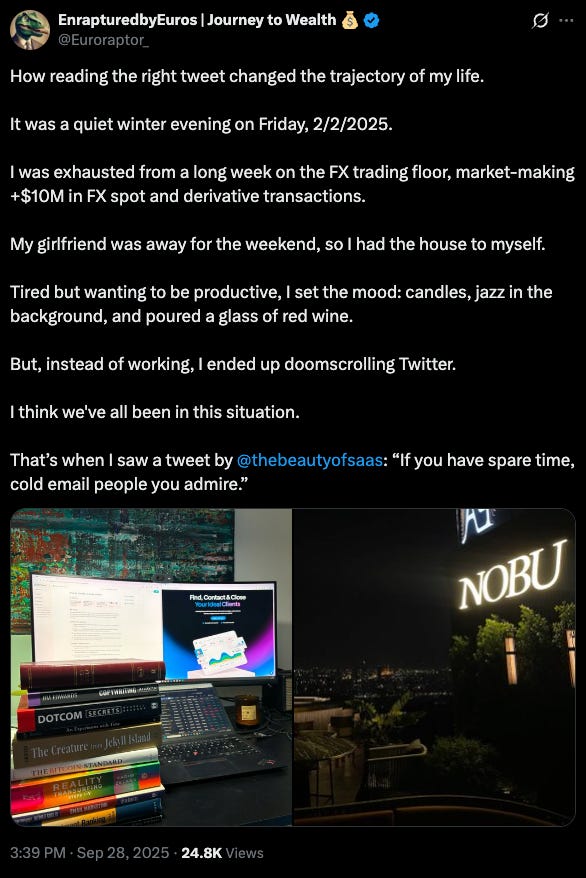
Mentorship isn’t a relationship between two people. It’s a dialogue between maturity and its reflection.
What a Banger. Really good post.